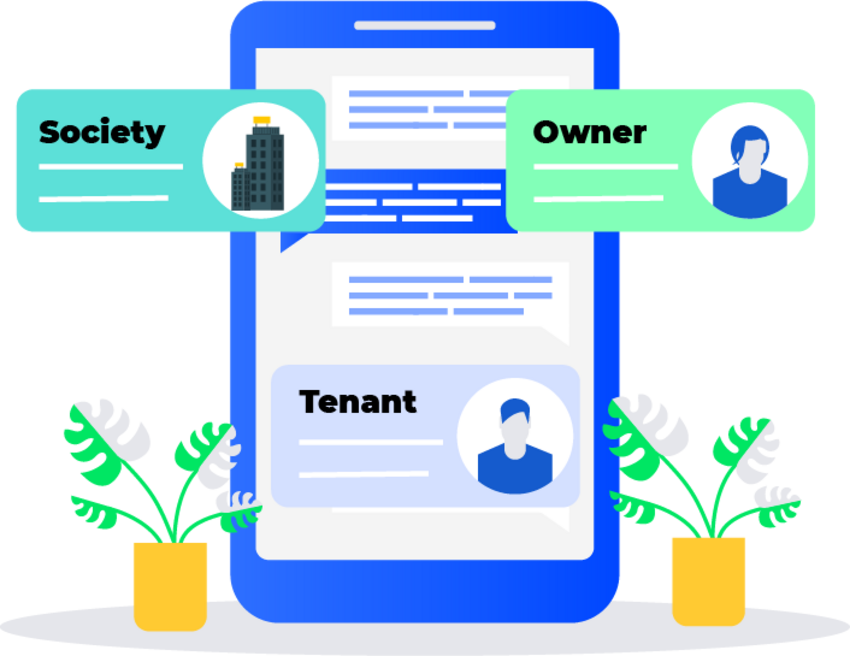The Benefits of a Tenant Management System
Introduction of Tenant Management System
A Tenant Management System (TMS) is a software application that enables landlords and property managers to efficiently manage their rental properties and tenants. The system provides a centralized platform to manage tenant information, lease agreements, rent payments, maintenance requests, and other property-related tasks.
The main objective of a Tenant Management System is to simplify the management of rental properties and automate time-consuming processes. With a TMS, landlords and property managers can easily track rent payments, generate invoices, and schedule maintenance tasks. The system also allows tenants to access their account information, pay rent online, and submit maintenance requests through a self-service portal.
Some of the key features of a Tenant Management System include:
Tenant and property management:
A TMS allows landlords and property managers to track tenant information, lease agreements, and property details.
Rent collection:
The system enables landlords to track rent payments, generate invoices, and receive payments online.
Maintenance management:
A TMS allows landlords to manage maintenance requests and schedule repairs.
Communication:
The system provides a platform for landlords and tenants to communicate and share information.
Efficient Tenant Management system
An efficient Tenant Management System (TMS) is a software application that streamlines the management of rental properties and tenants. Here are some key features and best practices for an efficient TMS:
Cloud-based platform:
A cloud-based TMS enables landlords and property managers to access their data from anywhere with an internet connection, making it easy to manage properties remotely.
Tenant portal:
A self-service portal allows tenants to access their account information, pay rent online, and submit maintenance requests. This helps to reduce the workload on property managers and improve tenant satisfaction.
Online rent collection:
A TMS that integrates with payment gateways allows landlords to easily collect rent payments online. This reduces the need for manual processes like check deposits and improves the accuracy and timeliness of rent collection.
Maintenance management:
A TMS that provides a platform for maintenance requests and scheduling repairs helps to ensure that repairs are completed promptly and efficiently. This reduces the likelihood of tenant complaints and helps to maintain the value of the property.
Lease management:
A TMS that tracks lease agreements and provides automated lease renewals and reminders helps to reduce the workload on property managers and ensures that leases are up-to-date and compliant.
Reporting and analytics:
A TMS that provides reporting and analytics tools to help landlords and property managers track key metrics like occupancy rates, rental income, and maintenance expenses. This enables them to make data-driven decisions and optimize the performance of their properties.
Improved Maintenance Management
Improved maintenance management is a critical component of an effective Tenant Management System (TMS). Here are some key features and best practices for improving maintenance management in a TMS:
Maintenance request tracking:
A TMS should provide a centralized platform for tenants to submit maintenance requests and track the status of their requests. This helps to ensure that maintenance issues are addressed promptly and efficiently.
Maintenance schedule:
A TMS should provide a scheduling tool to help property managers prioritize and schedule maintenance tasks. This helps to ensure that repairs are completed promptly and reduces the risk of more serious issues arising.
Work order management:
A TMS should provide a work order management system to track the progress of maintenance tasks and ensure that they are completed to the tenant’s satisfaction.
Communication:
A TMS should provide a communication platform to enable property managers to communicate with tenants about maintenance issues and keep them informed about the status of their requests.
Asset management:
A TMS should enable property managers to track the maintenance history of assets like HVAC systems and appliances, helping them to schedule preventative maintenance and reduce the likelihood of equipment failures.
Analytics and reporting:
A TMS should provide analytics and reporting tools to help property managers track maintenance expenses, identify trends, and optimize their maintenance strategies.
Optimized Property Performance
An effective Tenant Management System (TMS) can help landlords and property managers optimize the performance of their properties. Here are some key features and best practices for optimizing property performance in a TMS:
Occupancy tracking:
A TMS should provide tools to track occupancy rates and analyze trends. This enables property managers to make data-driven decisions about pricing and marketing strategies.
Rent collection:
A TMS should enable landlords to easily collect rent payments and track rent arrears. This helps to ensure that rental income is maximized and that tenants are paying on time.
Lease management:
A TMS should provide tools to manage lease agreements and automate lease renewals. This helps to reduce the workload on property managers and ensure that leases are up-to-date and compliant.
Maintenance management:
A TMS should provide tools to track maintenance requests, schedule repairs, and analyze maintenance expenses. This helps property managers optimize their maintenance strategies and reduce the risk of equipment failures.
Communication:
A TMS should provide tools to enable property managers to communicate with tenants and respond to inquiries and complaints on time. This helps to improve tenant satisfaction and reduce the risk of tenant turnover.
Analytics and reporting:
A TMS should provide analytics and reporting tools to enable property managers to track key metrics like occupancy rates, rental income, and maintenance expenses. This enables them to make data-driven decisions about property management strategies and identify opportunities for improvement.
Enhanced Security and Compliance
Enhanced security and compliance are important considerations for any Tenant Management System (TMS). Here are some key features and best practices for enhancing security and compliance in a TMS:
Data encryption:
A TMS should use encryption to protect sensitive data like tenant information and financial transactions. This helps to prevent unauthorized access and ensure data privacy.
User authentication:
A TMS should require user authentication to ensure that only authorized users can access the system. This helps to prevent unauthorized access and protect against data breaches.
Access controls:
A TMS should provide access controls to enable property managers to control user permissions and restrict access to sensitive data. This helps to prevent unauthorized access and ensure compliance with data privacy regulations.
Compliance tracking:
A TMS should provide tools to enable property managers to track compliance with regulations like the Fair Housing Act and the Americans with Disabilities Act. This helps to ensure that the property is compliant with relevant laws and regulations.
Audit trails:
A TMS should provide audit trails to track user activity and changes to data. This helps to detect unauthorized access and provide evidence for compliance audits.
Disaster recovery:
A TMS should provide disaster recovery capabilities to ensure that data is not lost in the event of a disaster like a fire or a flood. This helps to protect against data loss and ensure business continuity.
Better Tenant Experience
A Tenant Management System (TMS) can significantly enhance the tenant experience. Here are some ways a TMS can improve the tenant experience:
Online rent payment:
A TMS can enable tenants to pay rent online, making the process more convenient and secure. This can also help to reduce the risk of late or missed payments.
Easy maintenance requests:
A TMS can provide tenants with a centralized platform to submit maintenance requests, allowing them to report issues quickly and easily. This can help to ensure that maintenance issues are addressed promptly, improving tenant satisfaction.
Transparent communication:
A TMS can enable property managers to communicate with tenants in a transparent and timely manner, providing updates on maintenance requests, lease renewals, and other important matters.
Self-service portal:
A TMS can provide tenants with a self-service portal where they can view their lease agreements, rental payment history, and other important information. This can help to reduce the workload on property managers and improve tenant satisfaction.
Online lease renewal:
A TMS can enable tenants to renew their leases online, making the process more convenient and reducing the risk of lost paperwork or misunderstandings.
Mobile accessibility:
A TMS can be accessible from a mobile device, allowing tenants to access important information and communicate with property managers on the go.
Maximized Return on Investment
A Tenant Management System (TMS) can help landlords and property managers maximize their return on investment in several ways:
Increased efficiency:
A TMS can streamline property management processes, reducing the workload on property managers and enabling them to focus on high-priority tasks.
Improved maintenance management:
A TMS can optimize maintenance management by enabling property managers to track maintenance requests and schedule preventive maintenance. This can help to reduce repair costs and extend the lifespan of equipment and systems.
Reduced tenant turnover:
A TMS can enhance the tenant experience, improving tenant satisfaction and reducing the risk of turnover. This can help to reduce costs associated with tenant turnover, such as advertising, cleaning, and repairs.
Better rent collection:
A TMS can enable tenants to pay rent online, reducing the risk of late or missed payments. This can help to increase cash flow and reduce the risk of financial losses.
Data-driven decision-making:
A TMS can provide data analytics and reporting tools, enabling landlords and property managers to make data-driven decisions about property management strategies. This can help to identify areas for improvement and optimize property performance.
Improved security and compliance:
A TMS can improve security and compliance by encrypting sensitive data, enforcing user authentication and access controls, and tracking compliance with regulations. This can help to reduce the risk of financial losses due to data breaches or noncompliance.
Choosing the Right Tenant Management System
Choosing the right Tenant Management System (TMS) is essential for ensuring that the system meets the needs of your property management business. Here are some factors to consider when selecting a TMS:
Features:
Consider the features of the TMS and ensure that it includes the features that are important to your property management business. Some essential features to look for include online rent payment, maintenance management, tenant communication, lease management, and reporting.
Ease of use:
Ensure that the TMS is easy to use and intuitive for both property managers and tenants. The system should have a user-friendly interface that is easy to navigate and understand.
Customization:
Consider whether the TMS can be customized to meet the specific needs of your property management business. The system should be flexible enough to accommodate your unique workflows and business processes.
Integration:
Ensure that the TMS can integrate with other systems and software used in your property management business, such as accounting software, maintenance management software, and marketing platforms.
Security:
Consider the security features of the TMS and ensure that it includes features such as user authentication, data encryption, and access controls to protect sensitive data.
Support:
Look for a TMS vendor that provides excellent customer support, including phone and email support, online resources, and training materials.
Cost:
Consider the cost of the TMS and ensure that it provides good value for the price. Look for a TMS that offers flexible pricing options, such as monthly or annual subscriptions, and ensure that there are no hidden fees or charges.
Conclusion
In conclusion, a Tenant Management System (TMS) can significantly improve property management processes and enhance the tenant experience. By leveraging features such as online rent payment, maintenance management, tenant communication, lease management, and reporting, a TMS can streamline operations, reduce costs, increase productivity, and optimize property performance.
Moreover, a TMS can provide landlords and property managers with data-driven insights to make informed decisions, ensure compliance with regulations, and improve security. Choosing the right TMS requires careful consideration of features, ease of use, customization, integration, security, support, and cost.
Overall, investing in a TMS can be a smart choice for landlords and property managers who want to maximize their return on investment, improve tenant satisfaction, and stay ahead of the competition in the competitive property management industry.
What is Tenant Management System?
A tenant Management System is a software solution designed to streamline property management processes, enhance tenant experience, and optimize property performance. With features such as online rent payment, maintenance management, tenant communication, and reporting, Tenant Management System can help landlords and property managers efficiently manage their properties.
How can Tenant Management System improve my property management business?
A tenant Management System can help improve your property management business by automating repetitive tasks, reducing manual workloads, improving tenant experience, and optimizing property performance. By leveraging the features of the Tenant Management System, landlords, and property managers can save time, reduce costs, and increase productivity.
What are the benefits of using a Tenant Management System for my tenants?
A tenant Management System can provide numerous benefits to your tenants, including online rent payment options, easy communication with property managers, and improved maintenance management. With Tenant Management System, tenants can enjoy a seamless and hassle-free renting experience, which can improve their satisfaction and reduce the risk of tenant turnover.
Can Tenant Management System be customized to meet the needs of my property management business?
Yes, Tenant Management System can be customized to meet the specific needs of your property management business. With flexible customization options, you can tailor the system to fit your unique workflows and business processes, helping to improve efficiency and productivity.
How can Tenant Management System help improve my local SEO?
Tenant Management System can help improve your local SEO by providing a comprehensive online presence that includes your business information, reviews, and ratings. By optimizing your Google My Business profile and leveraging local SEO keywords, Tenant Management System can help attract potential customers and improve your online visibility.
Is Tenant Management System suitable for small businesses?
Yes, Tenant Management System is suitable for small businesses, as well as large enterprises. With flexible pricing options, Tenant Management System can be tailored to fit the budget and needs of your business, helping to reduce costs and increase efficiency.
How does Tenant Management System ensure security and compliance?
The tenant Management System ensures security and compliance by implementing strict security protocols, such as user authentication, data encryption, and access controls. Additionally, Tenant Management System adheres to industry standards and regulations, ensuring that your data is secure and compliant with all necessary laws.
Can Tenant Management System integrate with other software solutions?
Yes, Tenant Management System can integrate with other software solutions, such as accounting software, maintenance management software, and marketing platforms. By integrating with other software solutions, Tenant Management System can help streamline your business processes and improve efficiency.
What kind of customer support does Tenant Management System provide?
Tenant Management System provides comprehensive customer support, including phone and email support, online resources, and training materials. Our dedicated support team is available to assist you with any questions or issues you may have, ensuring that you get the most out of our software solution.
How can Tenant Management System help optimize property performance?
Tenant Management System can help optimize property performance by providing data-driven insights that enable landlords and property managers to make informed decisions. By leveraging reporting and analytics features, Tenant Management System can help identify areas for improvement, reduce costs, and increase revenue.
Contact us for More Services,
7) Chat Service
12) Video Designing
Contact Us
+91-9380797662
info@emazel.com
Author


